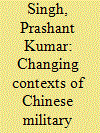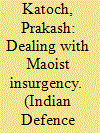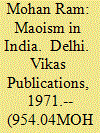|
|
|
Sort Order |
|
|
|
Items / Page
|
|
|
|
|
|
|
| Srl | Item |
| 1 |
ID:
143822


|
|
|
|
|
| Publication |
New Delhi, IDSA, 2016.
|
| Description |
174p.pbk
|
| Series |
IDSA Monograph Series no. 49
|
| Standard Number |
9789382169604
|
|
|
|
|
|
|
|
|
|
|
|
Copies: C:2/I:0,R:0,Q:0
Circulation
| Accession# | Call# | Current Location | Status | Policy | Location |
| 058469 | 355.033051/PRA 058469 | Main | On Shelf | General | |
| 058470 | 355.033051/PRA 058470 | Main | On Shelf | General | |
|
|
|
|
| 2 |
ID:
154389


|
|
|
|
|
| Summary/Abstract |
Hundreds of CAPF battalions have been raised and there is no reason they cannot deal with internal security issues. They must perform/be made to perform, and most importantly, dominate the Dandakaranya forest, where on occasional foray and chest-thumping are useless, Surely, we need to look at a more integrated and deeper approach including MHA taking direct responsibility and control of counter-maoists operations rather than merely dishing out CAPF units to states; reorganising CRPF units in CI role on the lines of Rashtriya Rifles/Assam Rifles; discontinue the practice of imposing IPS officers on CRPF organisations; give the CRPF their own officers, review their training and imbibe the culture of officers leading troops in operations and ensure unity of command. The MHA must get into the acto rather than bureaucrats looking over the shoulder towards the Army, and help our enemies in getting the army sucked in here too.
|
|
|
|
|
|
|
|
|
|
|
|
|
|
|
|
| 3 |
ID:
027055


|
|
|
|
|
| Publication |
DelhI, Vikas Publications, 1971.
|
| Description |
vii, 196p.hbk
|
|
|
|
|
|
|
|
|
|
|
|
Copies: C:1/I:0,R:0,Q:0
Circulation
| Accession# | Call# | Current Location | Status | Policy | Location |
| 006076 | 954.04/MOH 006076 | Main | On Shelf | General | |
|
|
|
|
| 4 |
ID:
078003


|
|
|
| 5 |
ID:
132168


|
|
|
|
|
| Publication |
2014.
|
| Summary/Abstract |
The PKK, a violent group seeking secession in southeastern Turkey through the use of terror and guerilla methods, has evolved through different strategic and pragmatic phases in pursuing its goal. Ocalan, the incarcerated leader, classified the PKK's objectives into four deliberate strategic periods and commenced the final period of Strategic Lunge in March 2010 (for establishing de-facto autonomy). To compare these periods to PKK's real evolution, this article reviewed the entire process of the PKK (1973-2012) through analysis of resolutions from PKK congresses/conferences and the characteristics of PKK violence (e.g., target status, incident type/location, form, and purpose). This study argues that as opposed to Ocalan's assessment, PKK moves-particularly after 1994-are based on emergent (ex-post) pragmatic shifts rather than predetermined (ex-ante) strategic plans, as verified by analysis of the nature/form of PKK violence. It also argues that the PKK's pragmatic moves permeated even into its ideology and declared goal. Contrary to Ocalan's four-stage strategic periods, the PKK's initial manifesto indicates a three-stage Maoist strategy for reaching its goal. However, the PKK's military attempt to reach the third stage in 1991 failed due to conditions that were not sufficient for realization of the third stage of Maoist strategy. As a result, the PKK quit pursuing military victory after acknowledging its defeat in 1994; instead, since it still possessed the ability to initiate violence, it strategically employed (and ceased) violence to supplement its campaign of political compromise and negotiation.
|
|
|
|
|
|
|
|
|
|
|
|
|
|
|
|
|
|
|
|
|